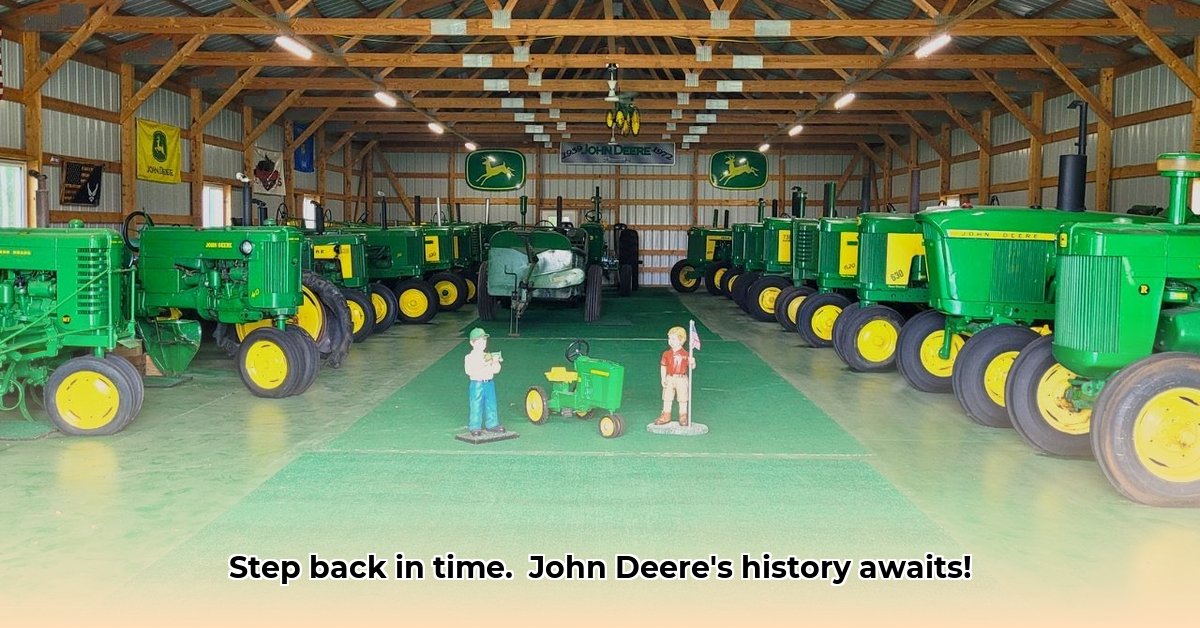
John Deere Tractor Collection: A Glimpse into History
For years, the Keller family's remarkable collection of over 525 John Deere and Minneapolis-Moline tractors remained a closely guarded secret. Now, this incredible assemblage—featuring rare finds, prototypes, and even the first and last models ever produced—is finally open to the public. This isn't just a collection; it's a journey through time, showcasing the evolution of farming technology and the enduring spirit of American agriculture. But preserving this extraordinary legacy presents unique challenges. This article explores the collection's history, highlights some of its most significant pieces, and examines the ongoing efforts to ensure its future. For more on John Deere collectibles, check out this site.
A Family's Green Dream: Generations of Dedication
The Keller family's passion for John Deere tractors spans generations, transforming a simple love of machinery into one of the world's most impressive private collections. Their dedication to preserving these iconic machines is a testament to their commitment to agricultural heritage. Each gleaming green tractor represents not just nostalgia but also significant advancements in agricultural technology. The sheer scale of the collection—row upon row of meticulously maintained machines—is breathtaking. How did this passion become such an incredible historical archive? The answer lies in the family's unwavering commitment, passed down through generations.
Did you know that the oldest tractor in the collection dates back to the early 1900s, predating many modern farming techniques? This fact highlights the collection's historical significance and its potential to inform modern agricultural practices.
Beyond the Rows: Stories Told in Steel
The collection boasts an array of rare and historically significant tractors, including experimental prototypes rarely seen outside of museums or private archives. The legendary Model D, a workhorse of its era, stands proudly alongside more modern descendants, showcasing the evolution of design and functionality. Each tractor holds a unique story, from its role on a particular farm to the innovations it embodied. The sheer diversity of models reveals the technological leaps and bounds made in agricultural machinery over the decades.
One particularly rare find is a prototype tractor featuring an experimental engine design, never put into mass production. This underscores the collection's importance in showcasing the experimental side of agricultural innovation. The collection provides tangible evidence of the constant evolution of farming technology.
“The tractors aren't just machines; they're living history,” says Sarah Keller, whose family has meticulously maintained the collection for decades. “Each one reflects the ingenuity and hard work of generations of farmers before us.”
More Than a Museum: Shaping Sustainable Agriculture
The Keller Collection is not simply a historical display; it's a vital resource for modern sustainable agriculture research. By studying the design and efficiency of these vintage tractors, researchers can derive valuable insights into fuel economy, durability, and repairable designs. This knowledge could lead to the development of more environmentally friendly and economically viable farm equipment. The collection's potential to influence the future of sustainable farming is immense.
Research suggests that some of the older models exhibit surprisingly high fuel efficiency compared to modern counterparts. This information could be invaluable to engineers developing more sustainable agricultural technologies. The collection’s potential to inspire future innovations is astonishing.
The Challenges of Keeping History Alive
Maintaining a collection of this scale requires significant resources. The ongoing costs of storage, maintenance, and restoration are substantial. The Keller family is actively seeking partnerships and exploring diverse funding options to ensure the collection's long-term preservation. The challenge highlights the importance of community support and innovative funding strategies for preserving historical artifacts.
The estimated annual cost of maintaining the collection is over $100,000, which demonstrates the financial burden of preserving these pieces of history. This illustrates the crucial need for ongoing financial support to maintain and preserve the collection for future generations.
A Call to Action: Join the Journey
The Keller John Deere tractor collection is more than a museum; it’s a living testament to the ingenuity and determination of farmers past and present. We encourage readers to visit the collection, learn about its history, and consider supporting its preservation, helping to ensure that this remarkable piece of American heritage remains accessible for generations to come.
Visit the Keller Collection today and experience the incredible story of agricultural innovation firsthand! The collection provides a unique opportunity to connect with the history of American agriculture.